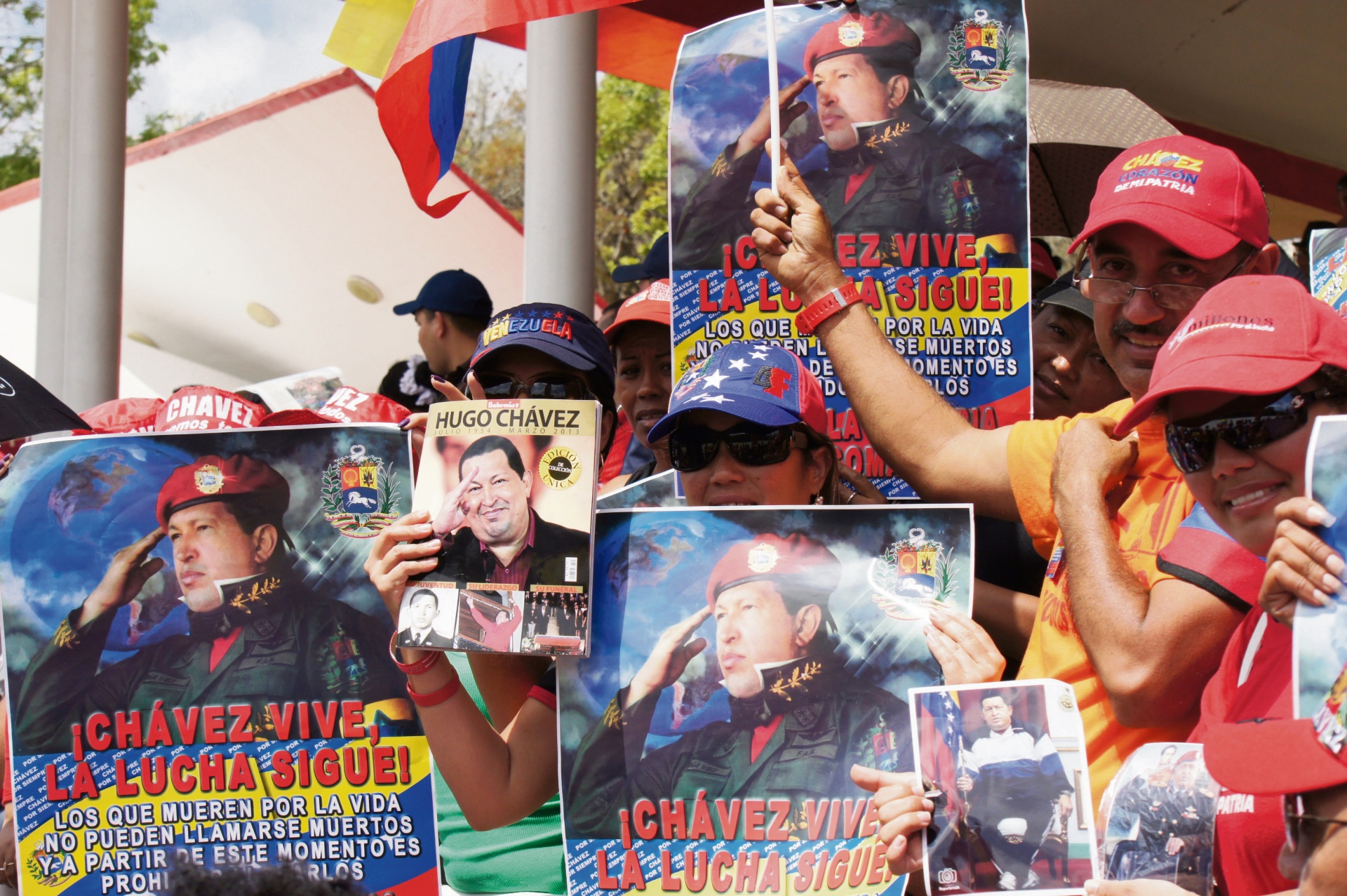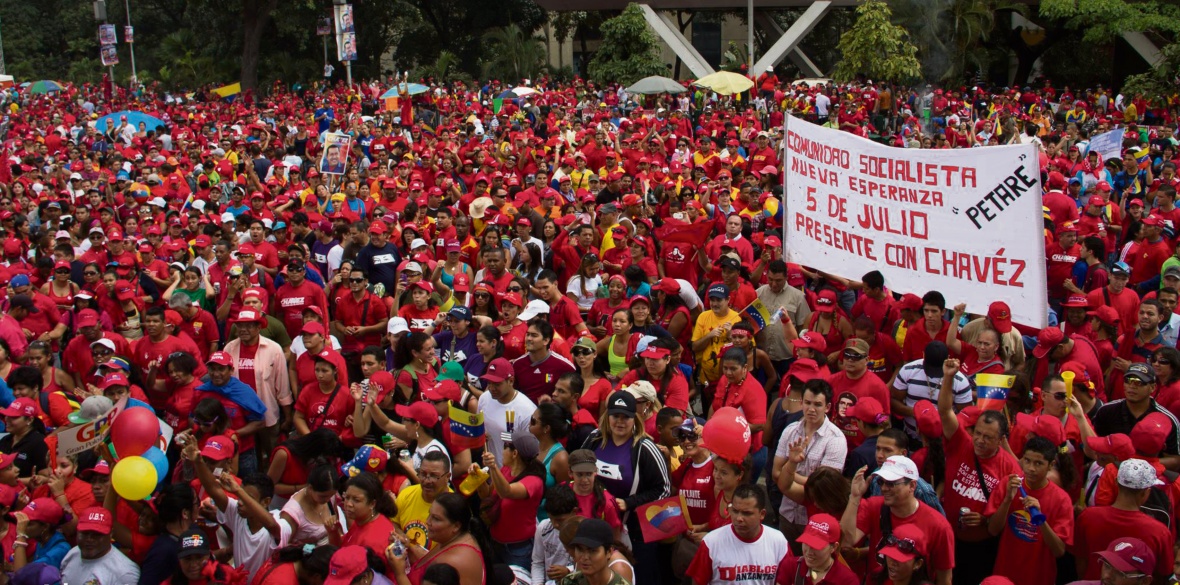This is the last article you can read this month
You can read more article this month
You can read more articles this month
Sorry your limit is up for this month
Reset on:
Please help support the Morning Star by subscribing here
SINCE the May elections in Venezuela and the overwhelming victory for the United Socialist Party of Venezuela (PSUV), the slew of articles attacking Jeremy Corbyn and the Morning Star via Venezuela have died down somewhat.
Hopefully the last of this tired genre seems to be a recent piece by Tommy Walters in the liberal-hipster outlet Vice.
In this particular piece, Walters takes aim at a recent event by the Venezuela Solidarity Campaign and the Morning Star’s election observer report, mostly interpreting what happened in a way I and other attendees wouldn't recognise.
That aside, however, the piece follows the same the same formula as other Venezuela attack pieces in the British press.
As this episode in red-baiting comes to a close, it's worth taking a step back to analyse them. There are very few subjects where every commentator follows an almost identical template in regards to what they argue and what they choose to ignore.
Each attack piece tends to covers three themes, and omit two others.
First, they almost always include a gruesome example of Venezuela's economic crisis to shock Western sensibilities, but don’t provide any economic analysis for its origins.
Second, they talk about “authoritarianism,” “intimidation” or “a slide into dictatorship,” terms that are vague enough to sound menacing but not specific enough to actually mean anything.
Third, there’s usually an outing of someone vaguely linked to Corbyn, which is then used as “proof” of his guilt by association to Venezuela.
Always missing from these pieces is, first, an understanding of Venezuelan history — both the pre-Bolivarian period and the long economic boom under Hugo Chavez — and, second, any attempt to answer why it is that millions of the poorest Venezuelans continue to support the revolution enthusiastically.

The first of the themes is always the economy. Walters repeats the various stories of the crippling inflation that has hit Venezuela, though, of course, economic analysis is absent.
Lazy platitudes about the “failure” of socialism is usually what comes in its place. To dispel this one only has to look at the figures.
Was GDP growth higher or lower in the Chavez years or in the pre-Chavez years? GDP grew at double the pace in Chavez’s early years, then at nearly three times the pace after 2003.
GDP per capita went from -0.8 per cent when the opposition had power, to +2.5 per cent after 2003 under the PSUV.
Was inflation higher under Chavez or under the right-wing opposition, which is seemingly favoured by Vice and certainly by others?
In 1997, the last year of the opposition’s administration, inflation hit 100 per cent. However, within just three years, Chavez’s prudent management had stabilised the currency, and inflation dropped to around 10 per cent. Inflation was maintained within a range not seen since the ‘80s.
Most impressive of all was the dramatic reduction of poverty. Extreme poverty fell by around 70 per cent during the Chavez years.
When these facts are highlighted, the usual response is that this was only due to the state oil sector, which enjoyed high commodity prices, meanwhile the infrastructure of the private sector was left to rot from socialist mismanagement stifling enterprise.
In reality, growth in the private sector outstripped that of the state sector between 19999-2012. Statistics, graphs and references are always absent from the Western commentators who attack Corbyn and Venezuela, and Walters’s piece is no exception.
It can be seen clearly from those statistics that socialist economic policies were not the root of Venezuela's crisis, since they were precisely the reason for the growth and stability that the PSUV administered for over a decade.
So one is forced to look at external factors Walters and other attack pieces refuse to engage with.

The fact that the price of oil crashed almost overnight in the first year of Nicolas Maduro’s presidency is ignored.
The crippling sanctions are ignored. The siphoning of essential goods across the border by Colombian paramilitaries is ignored.
The distorting effects of currency speculation by international finance are ignored. The economic impact of the wave of opposition riots, vandalism and blockades is ignored.
Walters’s and others’ second lazy argument is the ominous warnings about “dictatorship” and “authoritarianism.”
In terms of police repression, it is remarkable that Venezuela has remained as open as it has considering the pernicious terrorism that citizens have suffered at the hands of the opposition.
These include racist stabbings and burnings (where loyalty to Chavismo is assumed based on skin colour), execution of PSUV community organisers and local officials. This is the movement that Walters cites uncritically throughout the piece.
He also focuses on the recent election, dismissing the Star’s election observer when he explains Venezuela's secure and fair voting system.
Despite that, the author admits that there exists no electoral fraud, so the next line of argument is based on unspecified intimidation.
Are there any laws that intimidate the opposition? No. Were any opposition candidates killed or disappeared (as has happened routinely in the recent Colombian and current Mexican elections)? No.
Were ballot boxes stuffed or voters turned away? No. Walters’s only example is an anecdote about how ID is required to vote and then voting behaviour tracked. What evidence is there that the secrecy of the ballot was violated?
The countless election observers, that included the opposition, foreign governments not allied to Maduro, and many others do not agree.
Anecdotal evidence from embittered individuals outside the country is not a reliable source on the intricacies of electoral procedure, yet Walters dismisses legitimate reports from electoral observers out hand. Why?
So what intimidation exactly is he referring to? The only visible intimidation seems to be Maduro’s speeches, where he takes on the opposition in his usual fiery manner.
If name calling is the height of intimidation then I’m afraid Walters’s sources are going to have to grow a thicker skin. After all, Chavistas have been putting up with personal insults for much longer.
Calling Chavez and his dark skinned supporters “monkeys” was a favoured insult of the opposition which the British media generally supports.
Now the insults are mostly of a class nature, and their outrage that a lowly bus driver like Maduro has ideas above his station. These echo the media attacks on Chris Williamson, Derby bricklayer turned MP who had the temerity to enter politics without passing through private school.
On the issue of “authoritarianism,” Walters makes a truly ridiculous claim at the end by comparing Augusto Pinochet’s dictatorship in Chile to the elected Maduro government.
The US-backed Pinochet regime murdered and disappeared over 4,000 people, buried its victims in mass graves, implemented the systematic use of torture, ripped children from their mothers’ wombs, and banned all opposition press and organisation.
Which of those things precisely has the PSUV replicated? To believe that Chavismo comes anywhere close to those abuses is either wilful ignorance or an insult to the victims of fascism in Chile.
It is most unfortunate that English language readers only have such poor quality writing available to them. The Morning Star stands almost alone in reporting facts rather than fantasy.
I have no interest in merely defending a government or its policies.
The purpose of this response is to provoke Walters, Vice and others to analyse objectively what the Bolivarian revolution means, what the memory of Chavez means.
Chavez represented the first successful defeat of the “end of history” and US triumphalism.
In those times of defeat for the left, Chavez built an economy that provided both significant GDP growth together with equality. He combined that with a thoroughly internationalist outlook that encouraged social movements around the world.
The huge changes in the country together with popular mobilisation mean that those who had been excluded from politics for 500 years were finally able to take leadership of their own country for the first time.
Maduro is the continuation of that legacy, though with an incredibly difficult external situation as the key factor separating them.
For all these reasons, I expect Chavez will pass into popular folklore as Che Guevara has done. Western writers may oppose that and the movement he represents but if they're to write on it then it is incumbent on them to at least try to objectively understand why Maduro and the Bolivarian revolution still have the energetic support of the poor majority in Venezuela.
Surely that would be a more interesting line of investigation for Vice than just another smear against the Labour left?










